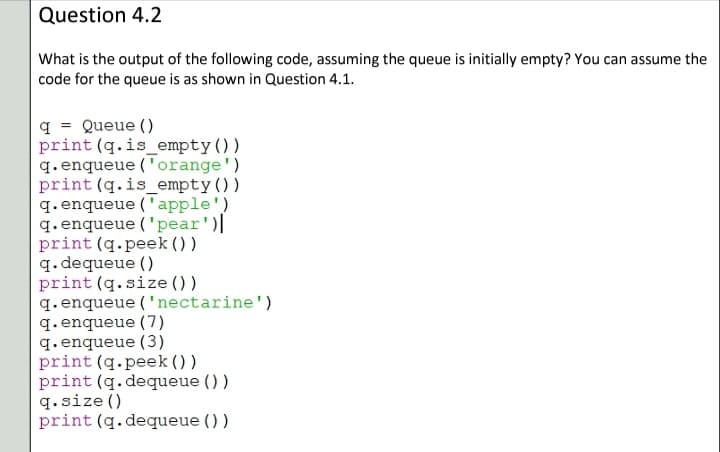Question 4.2 What is the output of the following code, assuming the queue is initially empty? You can assume the code for the queue is as shown in Question 4.1. q Queue () print (q.is_empty()) q. enqueue ('orange') print (q.is_empty()) q. enqueue ('apple') q. enqueue ('pear')| print (q.peek ()) q. dequeue () print (q.size ()) q. enqueue ('nectarine') q. enqueue (7) q. enqueue (3) print (q.peek ()) print (q.dequeue ()) q.size () print (q.dequeue ())
Question 4.2 What is the output of the following code, assuming the queue is initially empty? You can assume the code for the queue is as shown in Question 4.1. q Queue () print (q.is_empty()) q. enqueue ('orange') print (q.is_empty()) q. enqueue ('apple') q. enqueue ('pear')| print (q.peek ()) q. dequeue () print (q.size ()) q. enqueue ('nectarine') q. enqueue (7) q. enqueue (3) print (q.peek ()) print (q.dequeue ()) q.size () print (q.dequeue ())
Computer Networking: A Top-Down Approach (7th Edition)
7th Edition
ISBN:9780133594140
Author:James Kurose, Keith Ross
Publisher:James Kurose, Keith Ross
Chapter1: Computer Networks And The Internet
Section: Chapter Questions
Problem R1RQ: What is the difference between a host and an end system? List several different types of end...
Related questions
Question
100%
Question in image.
Please solve 4.2 the reference asked is also there in image.
Please explain how to do also.

Transcribed Image Text:Question 4.2
What is the output of the following code, assuming the queue is initially empty? You can assume the
code for the queue is as shown in Question 4.1.
q = Queue ()
print (q.is_empty())
q. enqueue ('orange')
print (q.is_empty())
q. enqueue ('apple')
q. enqueue ('pear')||
print (q.peek () )
q. dequeue ()
print (q.size () )
q. enqueue ('nectarine')
q. enqueue (7)
q. enqueue (3)
print (q.peek ())
print (q.dequeue ())
q.size ()
print (q.dequeue ())
![Section 4 - Queues
Question 4.1
Complete the following table to show the return value and contents of the queue after each function
call in the sequence, assuming the queue is initially empty. You can assume the code for the queue is
as shown below.
Operation
Return value
Queue contents (front of
queue shown on right)
q = Queue()
q.enqueue(2)
q.enqueue(4)
q.enqueue(6)
q.dequeue()
q.enqueue(5)
q.peek()
q.size()
q.dequeue()
q.dequeue()
q.is_empty()
q.enqueue(7)
q.enqueue(10)
q.size()
q.dequeue()
q.dequeue()
q.peek()
q.dequeue()
q.is_empty()
q.enqueue(12)
none
none
[2]
class Queue:
def _init__ (self):
self.items = []
def is empty (self):
return self.items
def size (self):
return len (self.items)
def peek (self):
return self.items[len(self.items) - 1]
def enqueue (self, item) :
self.items.insert (0, item)
def dequeue (self):
return self.items.pop ()
[)](/v2/_next/image?url=https%3A%2F%2Fcontent.bartleby.com%2Fqna-images%2Fquestion%2F2ed0c43e-c799-4452-ac1c-ddbc7a6dbec0%2Fa1eca58c-833c-476e-9dea-3f3df0b3b1c9%2Fewwatb_processed.jpeg&w=3840&q=75)
Transcribed Image Text:Section 4 - Queues
Question 4.1
Complete the following table to show the return value and contents of the queue after each function
call in the sequence, assuming the queue is initially empty. You can assume the code for the queue is
as shown below.
Operation
Return value
Queue contents (front of
queue shown on right)
q = Queue()
q.enqueue(2)
q.enqueue(4)
q.enqueue(6)
q.dequeue()
q.enqueue(5)
q.peek()
q.size()
q.dequeue()
q.dequeue()
q.is_empty()
q.enqueue(7)
q.enqueue(10)
q.size()
q.dequeue()
q.dequeue()
q.peek()
q.dequeue()
q.is_empty()
q.enqueue(12)
none
none
[2]
class Queue:
def _init__ (self):
self.items = []
def is empty (self):
return self.items
def size (self):
return len (self.items)
def peek (self):
return self.items[len(self.items) - 1]
def enqueue (self, item) :
self.items.insert (0, item)
def dequeue (self):
return self.items.pop ()
[)
Expert Solution
This question has been solved!
Explore an expertly crafted, step-by-step solution for a thorough understanding of key concepts.
This is a popular solution!
Trending now
This is a popular solution!
Step by step
Solved in 2 steps

Recommended textbooks for you

Computer Networking: A Top-Down Approach (7th Edi…
Computer Engineering
ISBN:
9780133594140
Author:
James Kurose, Keith Ross
Publisher:
PEARSON

Computer Organization and Design MIPS Edition, Fi…
Computer Engineering
ISBN:
9780124077263
Author:
David A. Patterson, John L. Hennessy
Publisher:
Elsevier Science

Network+ Guide to Networks (MindTap Course List)
Computer Engineering
ISBN:
9781337569330
Author:
Jill West, Tamara Dean, Jean Andrews
Publisher:
Cengage Learning

Computer Networking: A Top-Down Approach (7th Edi…
Computer Engineering
ISBN:
9780133594140
Author:
James Kurose, Keith Ross
Publisher:
PEARSON

Computer Organization and Design MIPS Edition, Fi…
Computer Engineering
ISBN:
9780124077263
Author:
David A. Patterson, John L. Hennessy
Publisher:
Elsevier Science

Network+ Guide to Networks (MindTap Course List)
Computer Engineering
ISBN:
9781337569330
Author:
Jill West, Tamara Dean, Jean Andrews
Publisher:
Cengage Learning

Concepts of Database Management
Computer Engineering
ISBN:
9781337093422
Author:
Joy L. Starks, Philip J. Pratt, Mary Z. Last
Publisher:
Cengage Learning

Prelude to Programming
Computer Engineering
ISBN:
9780133750423
Author:
VENIT, Stewart
Publisher:
Pearson Education

Sc Business Data Communications and Networking, T…
Computer Engineering
ISBN:
9781119368830
Author:
FITZGERALD
Publisher:
WILEY